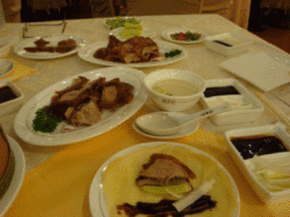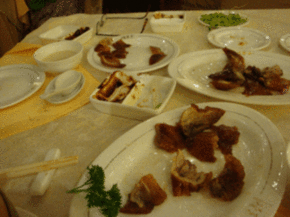Peking Duck
|
Before[China.org.cn] |
|
After[China.org.cn] |
◇ Why is Peking Duck number 6 on the list?
Peking Duck is the ultimate Holy Grail of the Chinese cuisine. The tradition of the duck goes back to the imperial era, and for good reason: it is nothing short of sheer awesomeness.
Now considered one of China's National Foods, the Peking Duck is prized for its eloquent taste and presentation combination that can be found at many of the restaurants around Beijing. More upscale restaurants have their very own duck farm and only a special type of duck can be used for the occasion.
◇ How it works:
Specialty ducks are bread just for Peking Duck and slaughtered after around 65 days. Traditionally, the legend goes that long ago the ducks actually came from Nanjing. They were small canal dwellers that sported black feathers. After the capital of China was moved to Beijing, canal traffic switched northward and grain ships began spilling grain into the canals on their way to the capital: the ducks flourished. By the Five Dynasties (907-960), the ducks had grown white feathers and become domesticated by local farmers. This new species is the kind of duck that Peking Duck is made from.
A lot of work actually goes into getting the duck onto the table. The prep work on a duck actually begins the day before. After being de-feathered and thoroughly washed with water (inside and out), the duck is treated to a quick dip in boiling water, and then is glazed with a layer of maltose syrup and hung up to dry. 24 hours later the duck can begin the primary roasting process and turns shiny brown.
The duck is roasted in a traditional hung oven that was developed in the imperial kitchens of the Qing Dynasty. The oven (made from bricks and fitted with metal griddles) is designed to roast upwards of 20 ducks simultaneously over hardwood from peach or pear trees. The ducks are roasted for 20-30 minutes at temperatures hovering 270°C (525°F).
Peking Ducks are traditionally carved in front of diners, giving them a feast for the eyes as well as the stomach. The skilled chef will expertly carve the bird in a specially choreographed pattern, leaving no piece to chance. The skin is traditionally served first in a sweet garlic and sugar sauce. Then the meat is cut from the rest of the bird and served on a series of specific plates. Along with the duck, diners should receive pancakes, scallions, a vegetable and sweet duck sauce.
The pancake is laid flat on the table and then a piece of duck is placed on top, along with a bit of scallion, vegetable, and sauce. Then diners fold the construction into a wrap and eat with the hands.
◇ Notable Restaurants:
A number of restaurants in China specialize in Peking Duck. Examples include Quanjude, Bianyifang, Changan Yihao, Beijing Xiaowangfu and Dadong Tuanjiehu Kaoyadian. Some restaurants, in particular Quanjude and Bianyifang, have long histories of serving high quality duck that they are now household names, or laozihao, literally "old brand name". In addition, Quanjude has received worldwide recognition, having been named a China Renowned Trademark in 1999.
I have personally been to Quanjude Restaurant and things here move like clockwork. Diners upon giving their name to the hostess are told to wait among the literal rows and rows of waiting chairs. The kitchen, separated by a pane of clear glass, tantalizes the taste buds as a merry go round of staff rotate and cooks the duck. After only a short, but hungry wait, a duck promptly arrives at the table and then the true feasting begins!
Peking Duck dinners, though moderately expensive, are excellent to celebrate rare occasions or for no reason in particular. This was hands down my all time favorite dish in China and I am already trying to find a way to curb my cravings after I head back State side.
(China.org.cn August 24, 2009)
 0 Comments
0 Comments









Comments